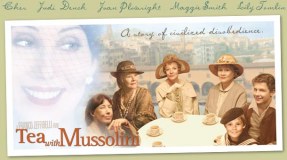Tea With Mussolini (1999)
 Cast:
Joan Plowright, Cher, Maggie Smith, Judi Dench, Lily Tomlin, Baird Wallace,
Charlie Lucas, Paul Checquer, Paolo Seganti, Massimo Ghini.
Cast:
Joan Plowright, Cher, Maggie Smith, Judi Dench, Lily Tomlin, Baird Wallace,
Charlie Lucas, Paul Checquer, Paolo Seganti, Massimo Ghini.
Screenwriters: Franco Zeffirelli and John Mortimer.
Music by: Stefano Arnaldi and Alessio Vlad.
Cinematographer: David Watkin.
Director: Franco Zeffirelli.
Grade: C
Review by Carlo Cavagna.
The latest film in the English-Speaking-People-Who-Discover-Themselves-in-Tuscany
genre is Tea With Mussolini, but this movie is a bit different from the
others. Director Franco Zeffirelli has great sympathy for the women who have
come to Italy to find art, sunshine, and the simple life, but he also skewers
the overly naive views held by some who see Tuscany as a playground of quaint
customs and colorful villagers. And yet, while it critiques movies like A
Room with a View and Stealing Beauty, Tea With Mussolini is similar
to them in that it is also a coming-of-age story. Interesting themes and a powerful
cast, however, do not prove sufficient to make Tea With Mussolini a memorable
film. It never sustains much dramatic tension or, indeed, much of a narrative
at all.
Tea With Mussolini opens in 1935, when, according to the introductory
captions, the winds of war were not yet blowing over Europe and Mussolini was
still "the gentleman who made the trains run on time."  Elsa
(Cher), Georgie (Lily Tomlin), Mary (Joan Plowright), Lady Hester (Maggie Smith),
and Arabella (Judi Dench) form a colony of English and American women in Florence,
where they spend their days collecting art, painting, and having tea in the
Uffizi Gallery. The uptight and judgmental Lady Hester is the widow of
the former British ambassador to Italy, as she never tires of reminding anyone
who will listen, and Smith portrays her with a well-stocked arsenal of snooty
looks and tart remarks. In contrast, Joan Plowright infuses the kindly and practical
Mary with warmth, while the third Englishwoman, Arabella, is a flighty and talentless
wanna-be artist and poet. (U.S. audiences used to the tough-as-nails Judi Dench
of Mrs. Brown, Shakespeare in Love and recent James Bond movies are in
for a surprise.) The Americans, Elsa and Georgie, are also a study in contrasts.
Brassy Elsa attracts and discards men by the dozens, although it turns out later
that she is less self-involved than she seems. Cheerful and soft-spoken Georgie
is a lesbian. Naturally, both of their lifestyles offend prim Lady Hester (Americans!
hmmph!).
Elsa
(Cher), Georgie (Lily Tomlin), Mary (Joan Plowright), Lady Hester (Maggie Smith),
and Arabella (Judi Dench) form a colony of English and American women in Florence,
where they spend their days collecting art, painting, and having tea in the
Uffizi Gallery. The uptight and judgmental Lady Hester is the widow of
the former British ambassador to Italy, as she never tires of reminding anyone
who will listen, and Smith portrays her with a well-stocked arsenal of snooty
looks and tart remarks. In contrast, Joan Plowright infuses the kindly and practical
Mary with warmth, while the third Englishwoman, Arabella, is a flighty and talentless
wanna-be artist and poet. (U.S. audiences used to the tough-as-nails Judi Dench
of Mrs. Brown, Shakespeare in Love and recent James Bond movies are in
for a surprise.) The Americans, Elsa and Georgie, are also a study in contrasts.
Brassy Elsa attracts and discards men by the dozens, although it turns out later
that she is less self-involved than she seems. Cheerful and soft-spoken Georgie
is a lesbian. Naturally, both of their lifestyles offend prim Lady Hester (Americans!
hmmph!).
These diverse women are brought together by their common language and love
of Italy. They are known locally as the scorpioni (scorpions), because
they also share a stubborn pigheadedness, and steadfastly refuse to flee Italy
even when it becomes obvious that war will erupt. But before that happens, a
boy enters into their lives – Luca (Baird Wallace and Charlie Lucas). He has
lost his American mother and whose father (a married Italian businessman) has
no use for him. Mary takes him in, and decides to raise him with the help of
the others. 
Meanwhile, the political situation is becoming tense, and with young Fascist
black-shirts running wild in the streets, the ladies begin to fear for their
safety. Lady Hester addresses the situation by making a social call on Il
Duce himself. Having tea with Mussolini, however, doesn't slow the advent
of World War Two, and when Italy enters the fray in 1941, the women become unwelcome
enemy aliens. At this point, Luca, nearly adult now, decides to repay their
kindness by doing what he can to protect them.
Whether Zeffirelli intended to make this point is unclear, but Tea With
Mussolini shows that no country wants to be viewed as just customs and cuisine,
and that the sometimes complacent or ignorant attitudes of outsiders can be
quite unwelcome, feeding the flames of nationalistic violence. Part of what
Mussolini's followers were seeking was a national identity for a young country
that had been occupied by foreign forces for centuries and was unified under
a single independent government only in the late 1800's. And, of course, they
wanted their own colonial empire. Lady Hester, who convinces herself that she
is under Mussolini's personal protection, sympathizes with these desires, but
fails to grasp that the colony of foreign women represents everything that the
young xenophobic Fascists resent, and thus, is oblivious to the danger she is
in.
Just to be clear, Zeffirelli is not taking the side of the Fascists, whose
ugliness and racism is fully revealed by the end of the story. Zeffirelli is
merely observing how complacency and resentment can feed off one another. Throughout
the movie, which is partly autobiographical, Zeffirelli shows great affection
for the scorpioni, with all their human foibles.
Despite Zeffirelli's compassionate treatment, he doesn't spin a very good yarn.
He never shows the flair for drama that he exhibited in Romeo and Juliet,
The Taming of the Shrew, and Hamlet. Instead we get the unfocused,
static (i.e., boring) narrative style that also characterized Brother
Sun/Sister Moon and Endless Love, which makes it difficult for the
viewer to care about the women as much as Zeffirelli does. Tea With Mussolini
is a pretty movie, well-acted, and somewhat interesting from a historical perspective,
but it doesn't transport us into the women's lives. True, many European films
(Tea With Mussolini is a British/Italian co-production) use atmosphere
and seemingly disconnected scenes to tell their stories, rather than traditional
linear narrative, but these elements never coalesce in Tea With Mussolini.
By the time we actually begin to care about whether the women will be saved,
it is too late to save the film.
Review © December 1999 by AboutFilm.Com and the author.
Images © 1999 Metro-Goldwyn-Mayer Studios Inc. All Rights
Reserved.
 Cast:
Joan Plowright, Cher, Maggie Smith, Judi Dench, Lily Tomlin, Baird Wallace,
Charlie Lucas, Paul Checquer, Paolo Seganti, Massimo Ghini.
Cast:
Joan Plowright, Cher, Maggie Smith, Judi Dench, Lily Tomlin, Baird Wallace,
Charlie Lucas, Paul Checquer, Paolo Seganti, Massimo Ghini. Elsa
(Cher), Georgie (Lily Tomlin), Mary (Joan Plowright), Lady Hester (Maggie Smith),
and Arabella (Judi Dench) form a colony of English and American women in Florence,
where they spend their days collecting art, painting, and having tea in the
Uffizi Gallery. The uptight and judgmental Lady Hester is the widow of
the former British ambassador to Italy, as she never tires of reminding anyone
who will listen, and Smith portrays her with a well-stocked arsenal of snooty
looks and tart remarks. In contrast, Joan Plowright infuses the kindly and practical
Mary with warmth, while the third Englishwoman, Arabella, is a flighty and talentless
wanna-be artist and poet. (U.S. audiences used to the tough-as-nails Judi Dench
of Mrs. Brown, Shakespeare in Love and recent James Bond movies are in
for a surprise.) The Americans, Elsa and Georgie, are also a study in contrasts.
Brassy Elsa attracts and discards men by the dozens, although it turns out later
that she is less self-involved than she seems. Cheerful and soft-spoken Georgie
is a lesbian. Naturally, both of their lifestyles offend prim Lady Hester (Americans!
hmmph!).
Elsa
(Cher), Georgie (Lily Tomlin), Mary (Joan Plowright), Lady Hester (Maggie Smith),
and Arabella (Judi Dench) form a colony of English and American women in Florence,
where they spend their days collecting art, painting, and having tea in the
Uffizi Gallery. The uptight and judgmental Lady Hester is the widow of
the former British ambassador to Italy, as she never tires of reminding anyone
who will listen, and Smith portrays her with a well-stocked arsenal of snooty
looks and tart remarks. In contrast, Joan Plowright infuses the kindly and practical
Mary with warmth, while the third Englishwoman, Arabella, is a flighty and talentless
wanna-be artist and poet. (U.S. audiences used to the tough-as-nails Judi Dench
of Mrs. Brown, Shakespeare in Love and recent James Bond movies are in
for a surprise.) The Americans, Elsa and Georgie, are also a study in contrasts.
Brassy Elsa attracts and discards men by the dozens, although it turns out later
that she is less self-involved than she seems. Cheerful and soft-spoken Georgie
is a lesbian. Naturally, both of their lifestyles offend prim Lady Hester (Americans!
hmmph!).

